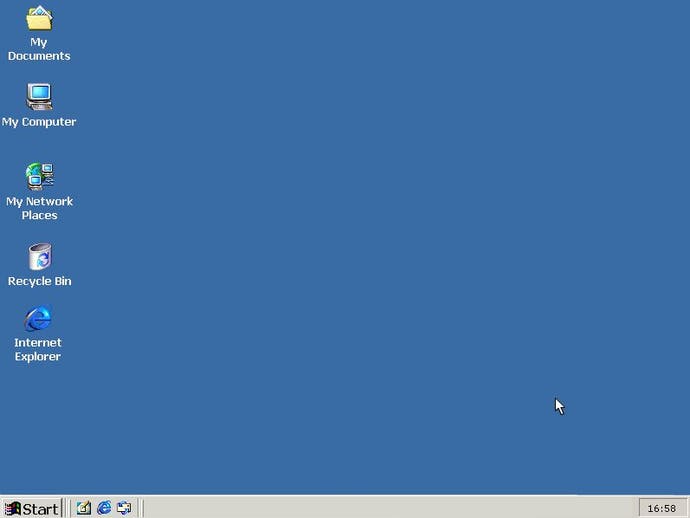Windows 2000 for Gamers Revisited
Article - we take an informal look at Windows 2000, nearly a year after its release, and look at whether its situation has improved, or not
About 8 months ago we took a look at Windows 2000, the (then) new Windows NT-based operating system from Microsoft, and tried to work out just why gamers already entrenched in heavily personalized Windows 98 installations should expend time and resources installing and maintaining this bloated mass of incompatibility and user-unfriendliness. Since then, circumstances have changed, twofold: firstly, drivers are now available for practically every device under the sun, and secondly, that every game released since last year now has in-built support for the operating system, making it a very viable alternative for both the casual and hardcore gamer alike, not to mention the hardware junkie. So if you're hanging onto Windows Millenium, Windows 98 or (God forbid) Windows 95, join us on a journey into the updated Windows 2000 and learn why you should give it more than just the time of day this on this occasion.

Hardware
Last time we tried out Windows 2000, we did so on what was a fairly well specced PC, and we used a GeForce DDR, a Voodoo3 2000 AGP, and a couple of brands of Pentium. Back then, drivers for the nVidia graphics card and its doomed 3dfx counterpart were still in Beta, and games that supported Windows 2000 were thin on the ground, thankfully including both Quake III Arena and Half-Life, though. Nowadays, the yeoman-like dependency of Windows 2000 means that not only does it power mission-critical servers at corporations all over the world, but it also features enough support for current graphics, sound, networking and Internet technology that it represents a stable platform for the home user, too. Every new graphics card that we tried had proper full releases for its Windows 2000 drivers, including all brands of GeForce, the ATI Radeon in its various incarnations and even 3dfx's line of now-discontinued Voodoos, 3, 4 and 5. Other cards, including those from Matrox and other, lesser manufacturers also have support. In fact, in all of our research, the only device we could lay our hands on that might be found in the average PC's gaming lunchbox and isn't supported properly was the Aureal Vortex 2, for which only Beta drivers are available. This is most likely because Aureal have gone bust. Elsewhere, the majority of mainstream hardware developers offer support for Windows 2000, and if you have some bizarre brand of modem that came with an OEM PC, you may be surprised to discover native support for it built into Windows 2000, something a lot of hardware now boasts.

Software
Apart from programs built on MS-DOS technology, which plainly refuse to work most of the time, Windows 2000 supports just about everything software-wise. In terms of gaming, again, only titles that are no longer in a position to be supported (such as System Shock 2) find themselves on the "incompatible" chart. Microsoft have released several Games Compatibility patches through their Windows Update website as well, which have helped. Overall, the general message is that Windows 2000 is no longer a connoisseur of incompatibility, but a very viable alternative to Windows 98 for users from all walks of life. There are still issues that dog Windows 2000 for gamers though. Firstly, there are problems with OpenGL and other graphics APIs. Some users are unable, for example, to run Half-Life in OpenGL, with their PCs condemning them to Direct3D, while others have no problems at all, even with very similar configurations. Similarly, there are inherent gamma issues under OpenGL that mean some games are overly dark and require tweaking to get them working adequately. That said, this writer has a fairly sizeable collection of games working flawlessly under Windows 2000, including Quake III Arena, Half-Life : Counter-Strike, No-One Lives Forever, Colin McRae Rally 2.0 and more. In general, the support is there, and the performance is identical if not better. The problem currently (to a lesser extent than before) is that unless you have tried Windows 2000 out for yourself on your own system it is very difficult to ascertain whether or not it will work for you correctly. The best thing to do is just try it when you next reinstall. Back up all of your important data and then run the setup, try it out for a while and see how you get on. You can always go back to Windows 98 in the long run if things don't work out - it's only a reformat away, and the next incarnation of Windows, XP, will replace both the 9x and NT lines, thus becoming Microsoft's convergence operating system.

Conclusion
There is still not enough evidence to guarantee either that your system will work flawlessly with Windows 2000, or that you won't encounter a small problem or two along the way, but as I'm sure most of you are aware, the trials and tribulations of getting a complex system like Windows 2000 up and running are far outweighed by its worth in the long run. This writer has never seen the OS fall over in the catastrophic circumstances that surround most Windows 9x errors. There are other benefits too, like improved memory handling. Installing Windows 2000 is a day's work, but maintaining it requires only seconds. If you plan the upgrade beforehand, you should have no trouble, and the less hassle in the long run, the more games that can be played.

